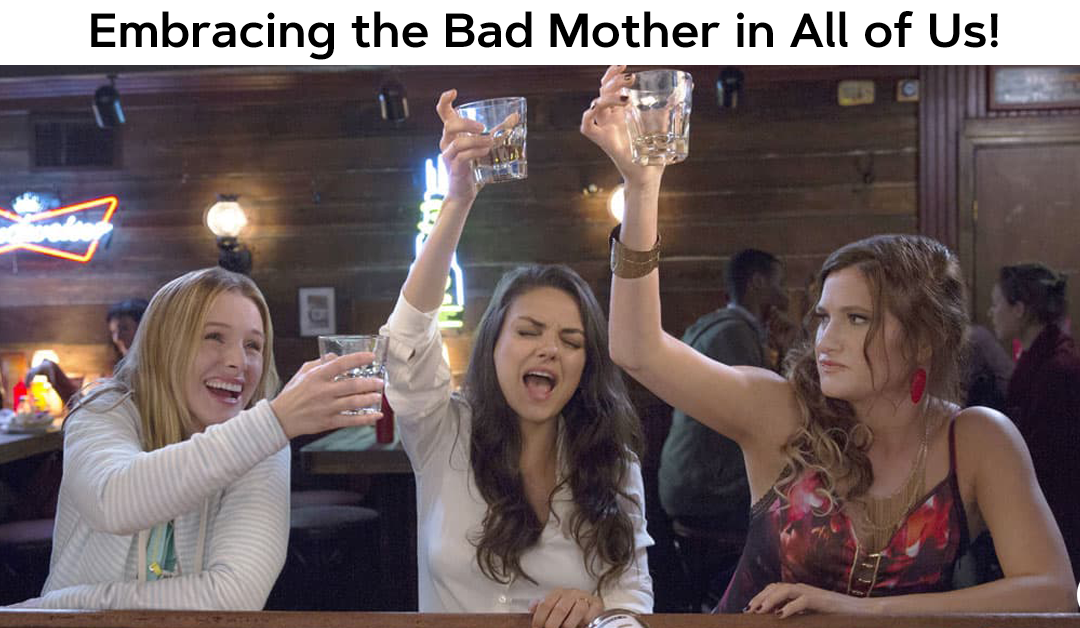Embracing the Bad Mother in All of Us!
Normally on Mother’s Day, we read articles and Hallmark cards highlighting all of the good deeds, affectionate gestures, and altruistic virtues of a “good mother.” We are bombarded with images of women cheerfully cleaning finger paint off of the wall, driving carpool, hauling soccer gear, or patiently waiting as their teenager ignores their very existence.
Yet week after week, I encounter countless numbers of women who feel that they have somehow or in some ways flunked motherhood. They are ashamed about the way they lost their temper, were absent, pushed their child too hard, didn’t push their child enough, or impacted their child’s life with their divorce. They are beating themselves up for being bad moms! (And dads, this is the same for you too but since it is Mother’s Day, I am wording this in the feminine.) They are berating themselves for not being the kind of mother they think they should be and blaming themselves for everything that goes “wrong” in their child’s life. They compare themselves and their children to others and condemn themselves for what they perceive to be their shortcomings. They focus on their “failures” and see their flaws as fatal. They feel tremendous guilt and shame about being what they hate to say out loud or even admit to themselves — a bad mom!
For many of us, our vision or ideal of who we should be as a parent was developed early on. We saw a movie or had a friend who seemed to have a picture-perfect mother and from that moment on, we decided that we wanted to be kind, creative, fun, smart, capable, and talented just like her. For others, this archetype of who we should be as a mother was born out of not wanting to be the traits or qualities that we disliked in the women closest to us, most specifically our mothers. We vowed to never be cruel, lazy, mean, judgmental, negative, weak, or a failure like our mother.
Our shadows are these unwanted qualities that we vow not to be. They are the characteristics that we hated in others or ones that caused us embarrassment or even emotional and physical harm. Committed to not being that which we judge in others, from an early age we started crafting our definition of what a good mother should be. Although it comes from a pure intention, the fact is our definition of who we should be as a parent is determined by our shadows. It is birthed from our childhood wounds or a very hurt part of ourselves that created this narrow view of who we should and should not be as a parent. It is fueled by denial and an overwhelming fear that we may turn into that which we hated. And it becomes etched in our psyche the moment we declare, “I will never be like my mother!”
As we are methodically piecing together the picture of the parent we think we should be, we don’t realize our evolution to being the fullest expression of ourselves as a parent, as well as a person, will not come from denying that which we don’t want to be but embracing everything that we are — good and bad!
As Carl Jung said, “I would rather be whole than good.”
Shadow work is based on the concept of wholeness. It is based on knowing that within us is every characteristic that we see in the outer world. To be the fullest expression of ourselves, we must unconceal, own, embrace, and integrate all of the characteristics that we have disowned or denied. To do this we must find the gifts of the negative characteristics that we judge and make wrong in our mothers or others.
- How could being lazy like your mother actually serve you?
- What would be possible if you embraced that you too were weak and needy? Would you be able to ask for help or not always have to be the strong one?
- Has not wanting to be negative like your mother caused you to see the glass as half full?
And how has not wanting to be a bad mother supported you in being a really good mother?
Many of us think that we need to be good to be effective and that we need to be perfect to be good. But the fact is our children will learn as much from the part of us that is a bad mother as they will from the part of us that is a good one.
Ultimately, the greatest gift we can give our children is to learn to love and accept themselves. We want them to find the lessons in their “mistakes,” the wisdom in their wounds, the perfection of their imperfections, and the fun in their flaws. We want to teach them new perspectives and to be aware of whether they are looking for what’s right or what’s wrong. We want them to put down the internal bat that they have used to beat themselves up and to open up to greater levels of understanding and compassion for themselves. By teaching them to find the gifts in that which they judge, we pave the way for them to love a part of themselves that they have seen as “bad.”
So on this Mother’s Day, I want to encourage you to invite that bad mother part of you to join in on the festivities. Acknowledge her for all she has taught you. Embrace her for the humanity she has brought into your household. And maybe even applaud her for providing some of the real and rawest moments that have and will add to the richness of the texture of the tapestry of your family.
Transformational Action Steps
(1) Make a list of the traits or characteristics that you think would or do make you a bad mom. Make sure you add all the traits that you saw in others, particularly your mother, and swore you would never be.
(2) Find the gifts of at least five of those traits. How have they served you?
(3) Write a letter of appreciation to the part of you that you see as your “bad mom.” How has it served you? What do you see are its gifts?
(4) Sign up for The Shadow Process or The Shadow Experience with your mother or daughter!



